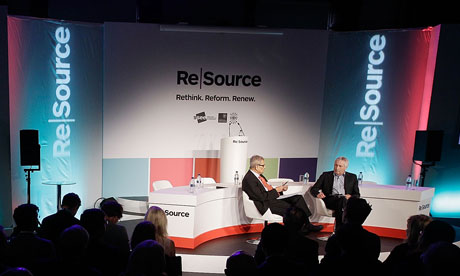Live blog from Oxford University: food, water and energy for all
Jo Confino blogs live from the high level Resource
sustainability conference at Oxford University's Smith School, which is
looking at new ways to manage resources and mitigate the risks of
scarcity

Nobel Laureate Amartya Sen of Harvard
University talks to broadcaster Jonathan Dimbleby at the ReSource 2012
conference in Oxford. Photograph: Matthew Lloyd/[Matthew Lloyd for
ReSource 2012]
A little known fact: An aircraft carrier does an average of 12 inches per gallon of fuel
If you worry about the mpg of your car, spare a thought for rear admiral Neil Morisetti, the climate and energy security envoy of the UK Ministry of Defence.
If you worry about the mpg of your car, spare a thought for rear admiral Neil Morisetti, the climate and energy security envoy of the UK Ministry of Defence.
When he was in charge of an aircraft carrier, he calculated that he used to get 12 inches for every gallon of fuel he used.
Morisetti
uses this example to point out that the Ministry of Defence is
increasingly needing to think, like other businesses, how to reduce its
reliance on fossil-fuels.
Without fuel, the army cannot fight but
securing supplies is increasingly difficult, and Morisetti gives the
example of the problems with getting fuel to troops in Afghanistan.
More than this, it has to be protected, it ties people down, and the cost of fuel in war zones is 10 times the normal price.
"We
have to have an energy plan which recognises we need to reduce costs
and risks by changing our behaviour," he says. "For example big bits of
kit needs generators while smaller bits of kids can use batteries."
If you read Jeremy Grantham's predictions of the future, pour yourself a stiff drink first
If
you are depressed about the sustainability challenges of our age, you
will be reaching for the bottle if you listen to Jeremy Grantham, the
head of successful fund manager GMO.
Grantham, says he is a
cheerful pessimist, seeing the glass as three-quarters empty, but there
was precious little liquid to see after hearing his view of the world.
He
says that it is possible to adapt to our current circumstances, but the
likelihood of that happening is limited due to a lack of courageous
politicians, vested interests, inertia and dedication to short-termism.
While
it may be possible to stop the global population at 10 billion, the
carrying capacity of the planet is likely to be less than five billion.
Added
to this is the extraordinary demands for raw materials from China,
which now uses 59% of the world's cement, 48% of all coal, 45% of all
steel and 47% of all pigs.
Beyond that, even if we get far better
at recycling, "metal is slipping through our fingers," and water
scarcity will lead to wars. Water problems are self-inflicted because
the problem is caused by waste and a lack of valuing it in terms of
pricing.
Soil erosion is accelerating and we are at a peak of
using fertilisers because prices have jumped five-fold and availability
will be limited in the future. Beyond that, the increase in beef
consumption is eating into the ability to produce crops such as rice and
wheat.
Grantham says that climate instability will lead to more
unprecedented weather changes and this will cause a ruinous drop in food
production.
Beyond all this, scientists have been underestimating
the threat from climate change and that the problem is far worse than
most people so far recognise.
"Almost all climate scientists recognise the problem is worse that they are saying," he says.
"Almost all climate scientists recognise the problem is worse that they are saying," he says.
Beyond
this, food currently accounts for at least 40% of poor household
incomes and with food prices likely to double over the next 20 years,
"who will pay for this?"
Perhaps Grantham's greatest vitriol is
aimed at incentives for the use of US maize for producing ethanol. As he
points out, the maize needed to produce the fuel to fill one tank of
one SUV, would feed an Indian person for a year.
Grantham finishes
up by quoting Churchill: "The era of procrastination, of half-measures,
of soothing and baffling expedients, of delays is coming to its close.
In its place we are entering a period of consequences."
How are you feeling now?
SOURCE:
How are you feeling now?
No comments:
Post a Comment